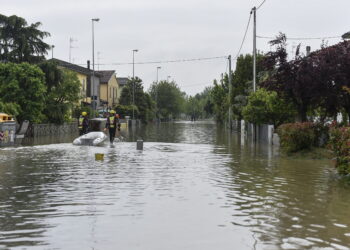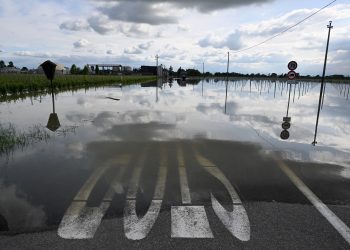Brussels – As Italy calculates the damage from storm Boris’s passage over Emilia Romagna and Marche, Brussels gives its final green light to the assistance requested more than a year ago for the floods that hit Emilia Romagna in May 2023. The EU Council has unblocked over one billion euros from the Union Solidarity Fund to deal with the consequences of six natural disasters in Italy, Slovenia, Austria, Greece, and France. Emilia Romagna and Tuscany will get nearly €450 million.
The EU Solidarity Fund (ESF) will be mobilized for a total amount of €1.28 billion. A record amount, including €446.64 million for Italy: €378.83 million for Emilia Romagna—including 94.71 million as an advance—and 67.81 million for Tuscany. Brussels also gave the green light to €428.4 million for Slovenia and €5.2 million for Austria, which were hit by severe flooding in August 2023; €101.5 million for Greece, brought down by the Mediterranean storm “Daniel” in September 2023; and €46.7 million for France, which was hit by floods in November 2023. The European Commission proposed and announced the amounts on August 27 after evaluating information received from the capitals.

With the EU facility, it is possible to cover part of the costs of emergency and recovery operations, such as repairing damaged infrastructure, protecting the population, securing preventive infrastructure, protecting cultural heritage, and clean-up operations. The EFS can fund these emergency and recovery operations retroactively from the first day of the disaster. As for Emilia Romagna, a month after the devastating floods of May 2023, the region reported €8.5 billion in damage, about half of which was to restore infrastructure such as roads, bridges, riverbanks, and canals. So far, the government has allocated €3.8 billion: €2.5 billion for securing the land and €1.3 billion for reimbursements to families and businesses.
More than a year later, Emilia Romagna and several other European regions have since dealt with new extreme weather phenomena, the latest of which was storm Boris. That’s why, while the EU Council released Solidarity Fund resources, the European Commission has proposed to allocate an additional €119.7 million from the CAP reserve to support farmers in Bulgaria, Germany, Estonia, Italy, and Romania, countries that “were hit by exceptional climatic adversity in the spring and early summer.”
The Commission divided the budget according to damage estimates sent to Brussels by the affected countries: €10.9 million to Bulgaria, €46.5 million to Germany, €3.3 million to Estonia, €37.4 million to Italy, and €21.6 million to Romania. Farmers, who after last winter’s tensions enjoy privileged attention from European institutions, “can count on the support of the European Commission to react to crises, adapt to new challenges and protect the future of their farms and families,” commented the EU Commissioner for Agriculture, Poland’s Janusz Wojciechowski.
Once adopted, national authorities will distribute the funds to beneficiaries by April 30, 2025. The member states will also have to notify the Commission by December 31, 2024, of the “details of the implementation of the measures, in particular the criteria used to determine the granting of individual aid, the expected impact of the measure, the payment forecast broken down by month until the end of April, and the level of additional support to be provided.” They should also explain the actions taken to avoid distortion of competition and overcompensation.
Stefan de Keersmaecker, a spokesman for the European Commission, pointed out that all member countries affected by extreme weather events can access the agricultural reserve of at least €450 million per year under the CAP for the period 2023–27. Today’s proposal must be approved on October 7. In Brussels for the meeting of the agriculture ministers of the 27, Francesco Lollobrigida suggested that—alongside the CAP—the EU would need a “strategic plan dedicated to infrastructure,” a kind of NRRP “for what concerns the water system, forest wildfires, and floods.”
English version by the Translation Service of Withub







![Una donna controlla le informazioni sul cibo specificate sulla confezione [foto: archivio]](https://www.eunews.it/wp-content/uploads/2014/12/Etichette-alimentari.jpg)

